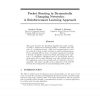Free Online Productivity Tools
i2Speak
i2Symbol
i2OCR
iTex2Img
iWeb2Print
iWeb2Shot
i2Type
iPdf2Split
iPdf2Merge
i2Bopomofo
i2Arabic
i2Style
i2Image
i2PDF
iLatex2Rtf
Sci2ools
102
click to vote
NIPS
1993
1993
Packet Routing in Dynamically Changing Networks: A Reinforcement Learning Approach
This paper describes the Q-routing algorithm for packet routing, in which a reinforcement learning module is embedded into each node of a switching network. Only local communication is used by each node to keep accurate statistics on which routing decisions lead to minimal delivery times. In simple experiments involving a 36-node, irregularly connected network, Q-routing proves superior to a nonadaptive algorithm based on precomputed shortest paths and is able to route e ciently even when critical aspects of the simulation, such as the network load, are allowed to vary dynamically. The paper concludes with a discussion of the tradeo between discovering shortcuts and maintaining stable policies.
Minimal Delivery Times | NIPS 1993 | NIPS 2007 | Precomputed Shortest Paths | Reinforcement Learning Module |
Related Content
| Added | 02 Nov 2010 |
| Updated | 02 Nov 2010 |
| Type | Conference |
| Year | 1993 |
| Where | NIPS |
| Authors | Justin A. Boyan, Michael L. Littman |
Comments (0)

